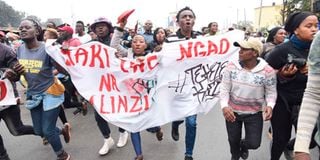Baptism by fire for the incoming government

Kenyans take part in a procession along Nairobi streets on July 7, 2022, to protest the high cost of living in the country during Saba Saba day.
What you need to know:
- The incoming government must negotiate to reschedule payments on both principle and interest.
- The incoming government also has some more deep-rooted and structural challenges.
- The government must be made to work better and faster so that it helps drive economic and commercial activity and not roadblock it.
Biting challenges confront the country and the incoming government, and they need attention sooner rather than later.
Sober decisions and, indeed, leadership are needed not only because the situation on the ground is tough and increasingly demanding, but also because it was tempting for the outgoing government to postpone or buy time with temporary or unsustainable decisions.
Take the subject of rocketing prices, which are here for the foreseeable future. It is one thing to introduce subsidies, it is another thing to financially sustain them when your income and tax base struggles to just manage day-to-day running costs.
Remember the country has been through so much since early 2020—Covid-19 and its wide-ranging disruptive fallout, drought, and rising prices of everything from fuel to foodstuffs.
It is worth pointing out that as things stand, upward price pressures will remain for the foreseeable future.
There will be a little relief on fuel prices as world crude prices have fallen by over 20 per cent since the end of June.
But that said, the relief will come more for a cash-strapped government that is still subsidising pump prices.
Any new government is going to have to be ready to ride and, indeed, manage the inflationary storm, otherwise, it could easily be overwhelmed by it very quickly.
There is another important point. Continuing subsidies ad infinitum is unsustainable and indeed the agreement with the International Monetary Fund (IMF) is that fuel subsidies must end by November.
There is a limit to how much we can borrow or live on extended credit and one of the most urgent priorities of the incoming government is to have serious talks with the IMF and other donors, the Chinese included, for both extra funding and debt rescheduling.
Talks with the IMF may be ongoing but must be ramped up quickly.
Any incoming government needs further cash support as soon as possible. I am not pandering to the donors. I am being realistic and stating the few options we have.
Reschedule payments
As regards debt, the incoming government must negotiate to reschedule payments on both principle and interest.
We are not even running to stand still. We are at risk of being forced backwards. We are being overwhelmed by debt. Or to put it more bluntly, the government and its population are drowning in a sea of debt.
Another acid test will be managing the inflation and updating the population proactively about what is being done about it. Gone will be the time for promises to bring prices down, especially if inflation continues in one way or another.
It is worth pointing out that inflation is a worldwide challenge and this time round it is particularly venomous.
Even if we did not have local factors fuelling inflation, we would still be hit by worldwide inflation, which in a number of economies is averaging around 8 per cent.
The incoming government also has some more deep-rooted and structural challenges, which it must start addressing in order to get this economy onto a more upward trajectory.
Much of the government operation is literally slowing down the economy. For example, conveyancing, including the buying and selling of property, should be one of the major dynamos of any economy.
Here it is a major undertaking and not for the faint-hearted as one has to deal with the bureaucracies of county government, Department of Lands and Physical Planning and Surveys.
In short, the government must be made to work better and faster so that it helps drive economic and commercial activity and not roadblock it.
When one looks around the world, many of the economies that have moved ahead faster have done so because the government is more of a driver rather than an impeder.
Coupled with this is corruption. The outgoing President has acknowledged that progress on this has been limited, which can be interpreted by many as an understatement.
Promising to reduce corruption is one thing, but walking the talk is the real test.
One cannot overemphasise the importance of reducing bureaucracy and corruption to unleash and grow the economy. The example of Rwanda is a good one in those regards.
Government is there to serve the people and look after them. The various arms and legs of law and order, whether they be the Kenya Police Service or the Judiciary, must be made to re-dedicate themselves to what is a sacrosanct public service. The operative word here is “public”.
In conclusion, the incoming government must hit the ground running. There is much to be done. While there may be a residue of goodwill it is likely to wear out quickly, especially if the going for many gets harder rather than easier.
The chances are that things will get a lot tougher before they get easier and resorting to stop-gap measures such as subsidies cannot last forever.
The cynical many are already saying nothing much will change. Let us wait and see. My word of caution for those coming into power is that this time round the situation on the ground is tense and urgent and time is of the essence.
The incoming government must manage crisis rather than be driven by one crisis after another
The writer is a public policy and economic analyst; Email:[email protected]





